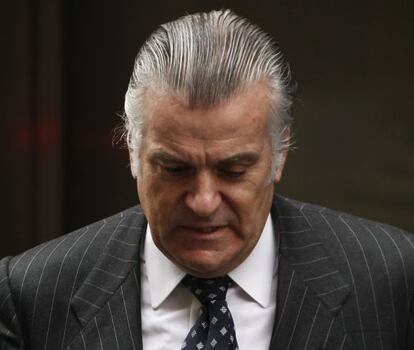Bárcenas ‘cleaned up’ illegal PP donations in official accounts
Figures in accounts sent to High Court and secret ledgers match up

The Popular Party (PP)’s former treasurer, Luis Bárcenas, concealed illegal party donations by breaking them down into smaller amounts and recording them as coming from anonymous donors.
The practice is revealed by cross-referencing the official finance records that the party has sent to the High Court with Bárcenas’ alleged secret handwritten ledgers, which EL PAÍS first published on January 31.
The secret papers, which reflect incoming and outgoing funds between 1990 and 2008, show donors’ names and the full amounts donated, which often violated party financing laws on two counts: first, they exceeded the 60,000-euro limit for any one individual or company; second, many donors were property developers who were simultaneously being awarded government contracts, a conflict of interest that is forbidden by law. There are single contributions of up to 250,000 euros, and the same individual donated 400,000 in one year. The legal limit was surpassed more than 30 times.
Around 1.2 million euros of donations were deposited in a dedicated account at Banco de Vitoria, while another 7.5 million euros reflected in the secret accounts was apparently used to make regular payouts to high-ranking members of the PP, who allegedly accepted these undeclared funds on top of their official salaries.
In order to prevent oversight bodies from picking up on this illegal funding, Bárcenas broke up the donations that went over the limit into smaller amounts on the PP’s official accounts, which are checked by the Audit Court. He also concealed donations from government contractors by putting them down as “anonymous.”
Since EL PAÍS published Bárcenas’ confidential ledgers, the PP has claimed that its accounts are perfectly legal because they were cleared by the Audit Court. But a cross-check of the official and unofficial books reveals the mechanisms of concealment used to trick the court supervisors.
For instance, on October 3, 2003 the secret ledgers show a 120,000-euro donation from the businessman Manuel Contreras. This amount was twice the legal limit. Three days later, on October 6, Bárcenas noted a 120,000-euro deposit in the Banco de Vitoria donation account.
The PP’s official books, which the party sent to court authorities, show that on the same day, the bank account received four separate deposits of 35,000, 40,000, 20,000 and 25,000 euros from “anonymous” sources. The sum is 120,000 euros. Similar examples are to be found for the years 2004, 2005 and 2007.
Both the donors and the PP officials who show up as recipients of undeclared cash (which include Prime Minister Mariano Rajoy) have vehemently denied the veracity of Bárcenas’ confidential accounts. The party’s secretary general, Dolores de Cospedal, said it was not true that the PP’s official accounts somehow reflected the illegal donations suggested by the Bárcenas books.
Bárcenas and his predecessor in the post, Álvaro Lapuerta, whose signature also shows up on the secret ledgers, both underwent a handwriting test in February to determine whether the annotations were really theirs (Bárcenas was promoted from manager to treasurer in 2008, after Mariano Rajoy became PP head).
Both men have officially denied having written or signed the ledgers. The results of the handwriting tests show that Bárcenas deliberately altered his writing style to throw off investigators; he has so far refused to take a second test.
Bárcenas, once a powerful and respected figure within the PP, has fallen from grace ever since he was removed from his post following his alleged involvement in Gürtel, an extensive bribes-for-contracts corruption case. Since then, the former treasurer has featured in a series of scandals, including the revelation that he held more than 20 million euros in Swiss bank accounts.
Tu suscripción se está usando en otro dispositivo
¿Quieres añadir otro usuario a tu suscripción?
Si continúas leyendo en este dispositivo, no se podrá leer en el otro.
FlechaTu suscripción se está usando en otro dispositivo y solo puedes acceder a EL PAÍS desde un dispositivo a la vez.
Si quieres compartir tu cuenta, cambia tu suscripción a la modalidad Premium, así podrás añadir otro usuario. Cada uno accederá con su propia cuenta de email, lo que os permitirá personalizar vuestra experiencia en EL PAÍS.
En el caso de no saber quién está usando tu cuenta, te recomendamos cambiar tu contraseña aquí.
Si decides continuar compartiendo tu cuenta, este mensaje se mostrará en tu dispositivo y en el de la otra persona que está usando tu cuenta de forma indefinida, afectando a tu experiencia de lectura. Puedes consultar aquí los términos y condiciones de la suscripción digital.








































